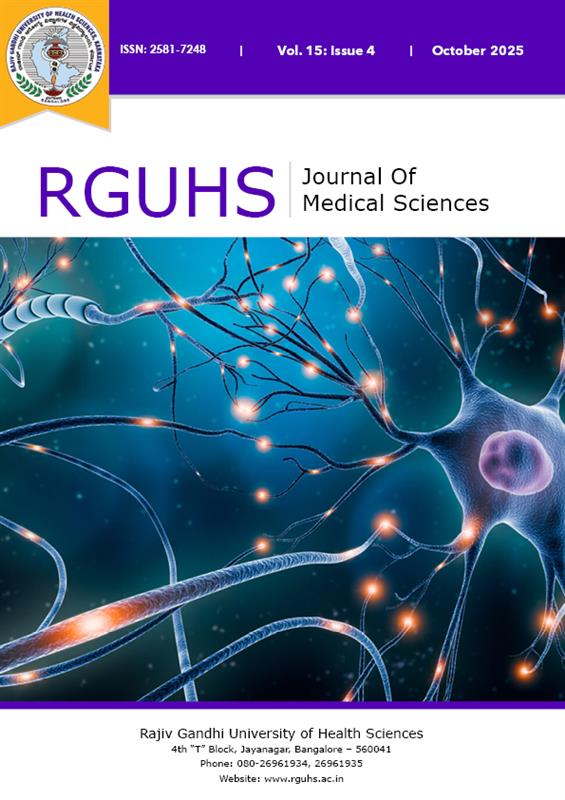
RGUHS Nat. J. Pub. Heal. Sci Vol: 15 Issue: 4 eISSN: pISSN
Dear Authors,
We invite you to watch this comprehensive video guide on the process of submitting your article online. This video will provide you with step-by-step instructions to ensure a smooth and successful submission.
Thank you for your attention and cooperation.
Rahul P. Ladda1 and Sangram Biradar2*
1 Post-graduate Student, 2 Associate Professor of Medicine, Mahadevappa Rampure Medical College, Kalaburgi - 585 105, India; drsangramb@gmail.com
Author for Correspondence :
Dr. Sangram Biradar,
Associate Professor of Medicine, Mahadevappa Rampure Medical College, Kalaburgi, - 585 105, India; drsangramb@gmail.com

Abstract
Objectives: There is a greater propensity for occurrence of thyroid dysfunction in patients with type 2 diabetes mellitus. A study was conducted to find out the prevalence and distribution of thyroid disorders in patients with type 2 diabetes mellitus. An attempt was made to evaluate the relationship between glycemic control and occurrence of altered thyroid functions in type 2 diabetes mellitus.
Material and methods: The study material consisted 150 patients with known type 2 diabetes mellitus or newly detected type 2 diabetes mellitus without known thyroid disorders. 3rd generation TSH assay was utilised to screen the patients with diabetes to know the status of thyroid profile.
Results: Among 150 cases of Type 2 diabetes 43(28.67%) had abnormal thyroid functions. Of these 23(15.34%) had subclinical hypothyroidism 16 (10.66%) overt hypothyroidism and 2(1.33%) each had subclinical and overt hypothyroidism. Thyroid disorders were noted more commonly among those having diabetes over a period of 5 years. There was a significant correlation between abnormal thyroid profile and family history of diabetes, BMI and serum lipid profile. There was significant co relation between diabetic control and abnormal thyroid profile.
Conclusion: Screening has to be performed to detect the presence of thyroid dysfunction in type 2 diabetes mellitus patients as the progression to overt thyroid dysfunction is associated with significant morbidity including the adverse effects on glycemic control, and lipid profile.
Keywords
Downloads
-
1FullTextPDF
Article
None
Supporting File
References
None